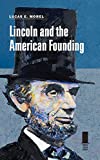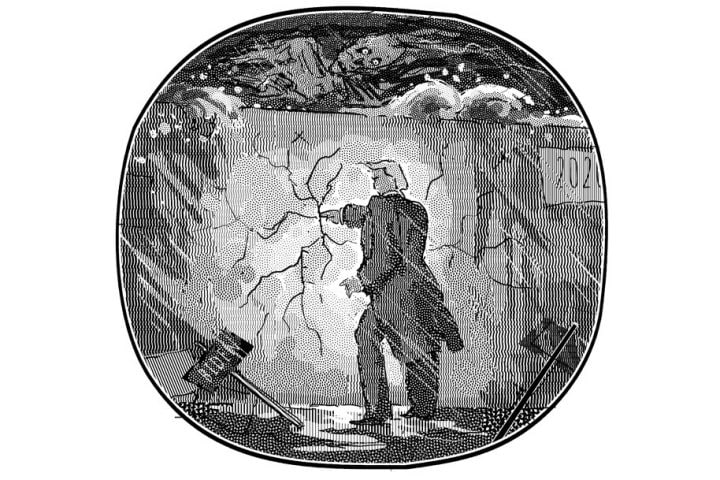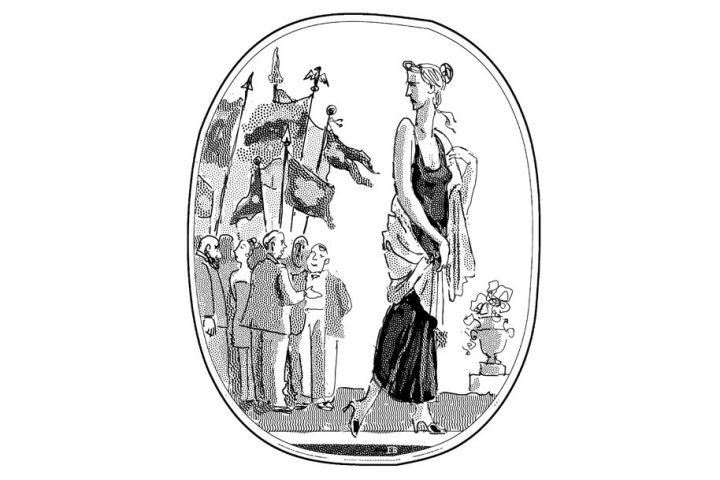Books Reviewed
Abraham Lincoln never let himself forget that he stood on the shoulders of the American Founders. In the 12 months between his emergence as a presidential contender after delivering a well-received speech at New York’s Cooper Union in February 1860 and his inauguration as the 16th president of the United States in March 1861, appeals and comparisons to the founders appear over and over again in what he wrote and said.
In the speeches he gave on tour after the Cooper Union address, he rebuked pro-slavery enthusiasts who worked themselves into a frenzy over his rival for the Republican nomination (and later his secretary of state) William Henry Seward’s 1858 “Irrepressible Conflict” speech (“irrepressible” being Seward’s warning, like Lincoln’s House Divided speech, that the antagonism between slavery and freedom could not be talked or bluffed away). “Jefferson said it,” Lincoln retorted. “Washington said it.” And there was nothing but “bushwhackery” in criticizing Seward for saying it. “We stick to the policy of our fathers,” Lincoln insisted, and that policy was what George Washington, “as President of the United States, approved” when he “signed an act of Congress, enforcing the prohibition of Slavery in the northwestern Territory.” Do not throw Washington’s strictures against sectionalism at Northerners, Lincoln warned. “Could Washington himself speak, would he cast the blame of that sectionalism upon us, who sustain his policy, or upon you who repudiate it?”
* * *
As he set out for Washington, D.C., from his home in Springfield, Illinois, Lincoln compared his inauguration during the secession crisis to the beginning of “a task…greater than that which rested upon Washington,” and on his cross-country journey to that inauguration, the guiding lights of the Revolution lined his path. Speaking in Trenton, Lincoln conjured up memories of his boyhood reading of Mason Weems’s celebrated life of Washington, with its vivid account of the general’s victory there. A deep impression had been made on the young Lincoln by “the contest with the Hessians” and “the great hardships endured at that time,” and he marked that as the first awakening of his sense “that there must have been something more than common that those men struggled for…something even more than National Independence;…something that held out a great promise to all the people of the world to all time to come.” And when, a day later, he spoke at Independence Hall in Philadelphia, Lincoln announced that he had “never had a feeling politically that did not spring from the sentiments embodied in the Declaration of Independence.” He did not propose any threatening gestures to Southerners, but he did promise to deal with them “as near as we possibly can, as Washington, Jefferson, and Madison treated you.”
* * *
Lincoln’s invocation of this revolutionary triumvirate stands coldly at odds with the Progressives’ later disdain for the founders’ government as merely “a variety of mechanics,” as Woodrow Wilson put it, and even more at odds with our modern therapeutic iconoclasts who imagine that removing statues of the founders will ease their own trauma. But Lincoln has just as often been the target of enraged conservatives, frequently of a libertarian or Southern agrarian bent, who indict him as the Great Betrayer of the Founders for supposedly constructing the civil-liberties-killing government behemoth. For the latter at least, Lucas Morel’s Lincoln and the American Founding should bring a cooling cloth to their fevered brows, since the Lincoln whom Morel, the head of the Politics Department at Washington and Lee University, lays out in five lapidary chapters—on the Constitution, original intent, slavery and its compromises, the founders’ goals, and Lincoln’s conservatism—is very much in the founders’ image, if not in fact (to borrow the title of Richard Brookhiser’s 2014 book on the same theme) the founders’ son.
Lincoln’s connection to the American Founders began with the elementary readers—the “preceptors”—he encountered in his boyhood, and from the founders he learned the abiding political question: how to perpetuate self-government from one generation to another. Because self-government was founded on rights fixed in nature, Lincoln had no notion that government was a wax nose, to be reshaped as each generation felt necessary, and so he made no appeal to a living constitution or evolving government. But, Morel adds, he “did not take for granted that the freedom achieved at the founding of the United States would be secure for all generations,” and his primary anxiety for the future of the republic lay in his fear that “freedom could be lost through its misuse by the citizens themselves.”
The guardrail against this loss would be in studying and emulating the founders. Lincoln’s reading taught him to look to Washington as the greatest of the founders for “establishing a regime devoted to freedom but that entailed a self-imposed restraint as necessary to ensure that freedom.” But Jefferson came a close second in Lincoln’s esteem. Privately, Lincoln had reservations about Jefferson’s lack of moral consistency. His law partner, William Herndon, thought that Lincoln “never liked Jefferson’s moral character.” Publicly, he lauded Jefferson’s “principles” in the Declaration of Independence as “the definitions and axioms of free society.” It is through Jefferson and Jefferson’s announcement that “all men are created equal” that Lincoln is connected to John Locke, and it is Jefferson’s notion of equality—that all are born with equal rights—which governments are designed and organized to protect. Possessing those rights, people first consent to be governed, and then are governed; otherwise, they must receive rights out of the charity of the governors.
* * *
If the Declaration captured for Lincoln the end the founders saw for government, then the Constitution was the means for realizing that end. He caught this relationship in 1861 in a Biblical simile drawn from Proverbs 25—“a word fitly spoken is like an apple of gold in a picture of silver”—by construing the Constitution as “the picture of silver” and the Declaration as the “apple of gold.” He found it impossible to regard the Constitution as a mere “compact,” to be set aside whenever parties to a controversy decided to secede. But, to the despair of abolitionists, he also refused to treat it as a mere paper barricade when they demanded the immediate elimination of slavery. “I am naturally antislavery,” Lincoln said in 1864. “And yet I have never understood that the Presidency conferred upon me an unrestricted right to act officially upon this judgment and feeling.” His original plan for emancipation in 1861 was a gradual federal buy-out. But even when he turned to an outright emancipation proclamation in 1863, it was still done on the terms of his constitutional “war powers” as commander-in-chief. Still, he was never entirely satisfied until a constitutional amendment had been secured as “a King’s cure for all the evils.”
He was—and this forms an entire chapter for Morel—a master and respecter of compromise. To demand outright abolition satisfied a certain perfectionist passion, but at the price of forfeiting not only the Constitution, but the entire principle of government by consent of the governed. But Lincoln was just as leery of Senator Stephen Douglas’s principle of “popular sovereignty,” which emerged in the 1850s as a kind of bastardized version of consent, in which the “consent” of any majority was sufficient to override the inalienable rights of a minority. Each strategy, even when done in the name of freedom and equality, would end up destroying rights, liberty, and equality together.
* * *
It would be easy to discount Lincoln’s reverence for the founders and their documents as an unthinking appropriation of habits and patterns which were simply close to his own times, and which could have no possibility of application in the multicultural, globalized, internet society which lay ahead. Easy, but wrong. Morel is at pains to present Lincoln as an originalist, facing (in Douglas’s popular sovereignty) a major challenge in constitutional interpretation which anticipated precisely the appeal to “diversity” which is supposed to be a hallmark of later times. States’ rights was, after all, the earliest assertion of political diversity, and popular sovereignty was nothing if not an appeal to a multiculturalism in which each territory and state decided what freedom was. Lincoln had, in fact, already pushed back in the name of originalism against an earlier claim to constitutional authority in Chief Justice Roger Taney’s Dred Scott v. Sandford decision in 1857. And Lincoln was likewise guided by originalism during his presidency in his suspension of habeas corpus, in his authority to call up federal forces to suppress the Southern rebellion, and, ultimately, in his submission to the constitutional demand for re-election in 1864. “Lincoln,” Morel concludes, “taught the American people that how they governed themselves is as important as the ends to which they govern.”
He did not litter his speeches and writings with footnotes, and so it comes as a surprise to discover how frequently even ordinary phrases and vocabulary from the founders bubbled up from his extraordinarily retentive memory. In his first bid for a seat in the Illinois state legislature, Lincoln declared that “[e]very man is said to have his peculiar ambition. Whether it be true or not, I can say for one that I have no other so great as that of being truly esteemed of my fellow men.” Becomingly humble as that was, it was not original. He had borrowed it from Washington (in David Humphreys’s Life of General Washington): “It is said that every man has his portion of ambition…. My only ambition is to do my duty in this world as I am capable of performing it and to merit the good opinion of all men.” When, in 1861, Lincoln told Congress that “[o]ur popular government has often been called an experiment,” it was because Washington had been the first to do so, in his final presidential address to Congress: “I cannot omit the occasion to congratulate you and my country, on the success of the experiment.” When the editor of a proposed biographical dictionary of Congress sent Lincoln a form to fill out, the president described his education in only one word—“defective.” This sounds humorously self-deprecating—until we realize that this was the word Washington used to describe his own education. Only someone who saw himself thoroughly cloaked in the ideas of the founders could have responded to a suggestion that he unilaterally expand the terms of the Emancipation Proclamation with the question, “Would I not thus give up all footing upon constitution or law? Would I not thus be in the boundless field of absolutism?”—words which almost perfectly copy those of Thomas Jefferson, who warned in 1791 against the temptation “to take possession of a boundless field of power.”
* * *
If anything, the longer Lincoln lived, the more the founders became living presences for him. In his first great speech, in 1838 at age 28, “The Perpetuation of Our Political Institutions,” he spoke of the founders as a generation whose living example was passing away as ranks of the founders themselves yielded to “the silent artillery of time.” But in the 1850s, as he advanced to the front ranks of the anti-slavery cause, the founders came dramatically alive. They inhabit every cranny of his Peoria speech that announced his return to politics in October 1854. The Cooper Union address is a painstaking exegesis of the founders’ ideas and intentions for the western territories. The founders form the “mystic chords of memory” he appeals to in his First Inaugural, and his repudiation of the “compact” theory of the Union in that Inaugural is of a piece with Alexander Hamilton’s repudiation of it in Federalist No. 22, just as Lincoln’s appeal to those “mystic chords” echoes James Madison’s eloquent appeal in Federalist No. 14 to the “chords of affection” that “knit together…the people of America.” And in the Gettysburg Address, their “proposition” is the rock against which the rebellion dashes itself in vain. As Richard Brookhiser so tellingly noticed, Lincoln did not call for “a birth of new freedom,” as though Lincoln was attempting to substitute some imaginary new regime for the old constitutional one, but “a new birth of freedom.” In Lincoln’s eye, Gettysburg and the Civil War would sponsor a revival of the old freedom.
It is no accident that, in the current agony of our politics, the mobs who seek to refashion the American “experiment” in the image of the Jacobins and the Bolsheviks have taken a statue of Lincoln and an emancipated slave as one of their prime targets, along with others of Washington and Jefferson. In their rage against the Declaration and the Constitution, they will find in Lucas Morel’s Lincoln and the American Founding a bar in their path to the drunken fleshpots of power, a Lincoln who offers instead an apple of gold in a picture of silver.





